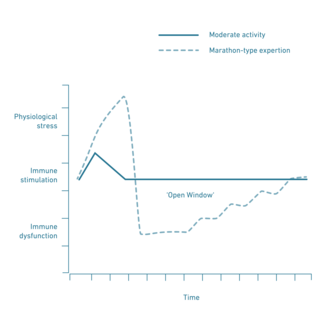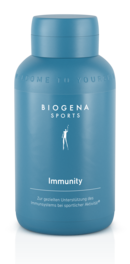Open window, let fresh air in. Regular ventilation is thought to reduce virus concentrations and thus to be beneficial to health. However, athletes have experience of the opposite to their cost – the so-called open window effect.
What is the open window effect?
It’s not about opening up an old building or a triple-glazed window. It’s about the body opening up an "immunological" window whereby one becomes more susceptible to infectious diseases. The open window effect actually favours becoming ill after exercise.
Why does the effect occur after exercise?
In the case of intensive training or a competition, immune parameters such as the number of natural killer cells as well as the B and T lymphocytes in the blood first increase sharply, but in the closing phase (cool-down phase) they plummet steeply below the initial level. This temporarily reduces resilience and opens the “window” for pathogens. The upper respiratory tract in particular is then susceptible. Cough, rhinitis, sore throat are the result – the classic symptoms of flu-like infections. This is accompanied by tiredness and exhaustion – you simply feel less efficient.
When does the open window effect start?
This depends on the duration and intensity of the exertion. From moderate exertion, such as 45 minutes of easy running, an athlete’s body recovers relatively quickly, within a few hours. After particularly hard strength training, on the other hand, it can take several days for the immune system to reach its full resilience again. After a marathon, this regeneration time actually increases to one to two weeks until everything is again as before the period of stress. This is also because particularly high levels of intensity temporarily lead to increased stress. This increases the level of the stress hormone cortisol, dampening the immune system.
The following figure shows that moderate exercise leads to mild changes in the immune system, while prolonged, intense endurance activities (e.g., marathon) cause immune dysfunction, increasing the risk of upper respiratory infections.

How can the open window effect be avoided?
Especially in the colder seasons, you should get back into the warm quickly and change out of any wet or damp clothes. And of course: regeneration, regeneration, regeneration. Leisure and amateur sports enthusiasts in particular tend to forego a regeneration period because they have too little time for their favourite sport anyway. However, appropriate sports breaks are not only useful and necessary for the health, but also for an optimal training effect.
Because prevention is known to be better than healing, the open window effect can be tackled in advance. With a balanced, healthy diet, for example. But also with supplements that strengthen the immune system.
Vitamins C, A and D, which ensure the smooth functioning of the immune system in times of increased stress, are particularly important. Vitamin C relieves and prevents cold problems, vitamin A supports the barrier function of the mucous membranes. Vitamin D, in turn, reduces the severity of symptoms and the duration of progression in the case of upper respiratory tract disorders. The health-promoting vital mushrooms Reishi, Cordyceps and Shiitake are also beneficial. In traditional Chinese medicine, they are considered natural strengthening agents. By the way, the trio of black pepper, curcuma and echinacea also promises a real immune boost.
In simple terms the following applies: Everything that prophylactically strengthens the immune system counteracts the open-window effect. This allows you to close the window more quickly and viruses and bacteria have less chance of putting a strain on your body and forcing it to take a sports break.










